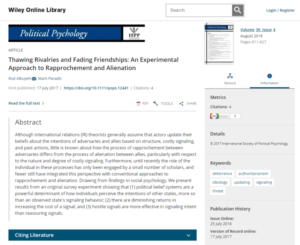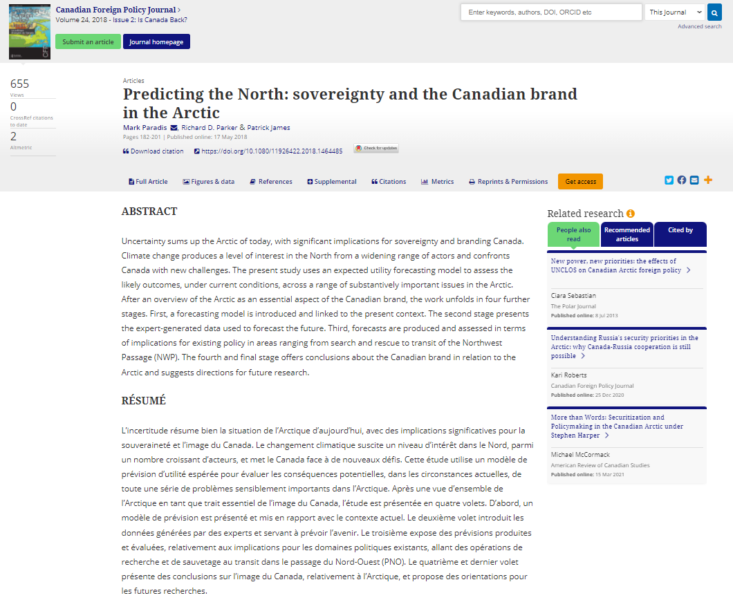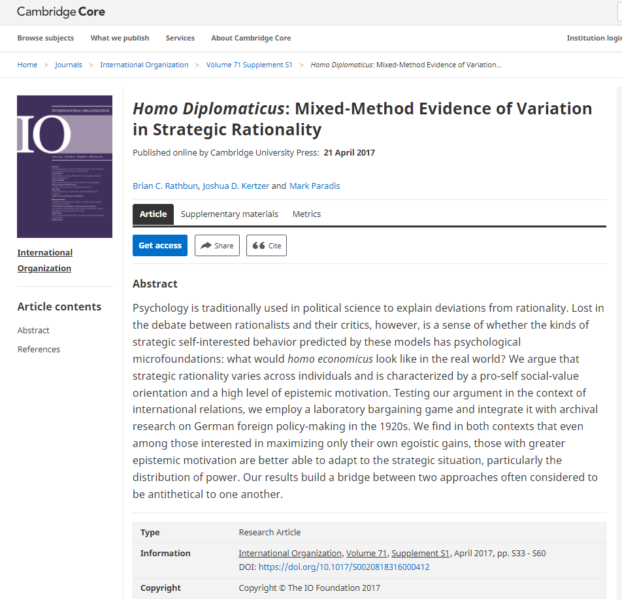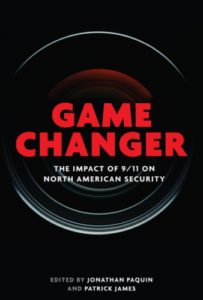Publications
Albuyeh, Rod and Mark Paradis. 2018. “Thawing Rivalries and Fading Friendships: An Experimental Approach to Rapprochement and Alienation.” Political Psychology 39 (4): 743-992.
Abstract: Although international relations (IR) theorists generally assume that actors update their beliefs about the intentions of adversaries and allies based on structure, costly signaling, and past actions, little is known about how the process of rapprochement between adversaries differs from the process of alienation between allies, particularly with respect to the nature and degree of costly signaling. Furthermore, until recently the role of the individual in these processes has only been engaged by a small number of scholars, and fewer still have integrated this perspective with conventional approaches to rapprochement and alienation. Drawing from findings in social psychology, We present results from an original survey experiment showing that (1) political belief systems are a powerful determinant of how individuals perceive the intentions of other states, more so than an observed state’s signaling behavior; (2) there are diminishing returns in increasing the cost of a signal; and (3) hostile signals are more effective in signaling intent than reassuring signals.
Paradis, Mark, Richard D. Parker, and Patrick James. 2018. “Predicting the North: Sovereignty and the Canadian Brand in the Arctic.” Canadian Foreign Policy Journal 24 (2): 182-201.
Abstract: Uncertainty sums up the Arctic of today, with significant implications for sovereignty and branding Canada. Climate change produces a level of interest in the North from a widening range of actors and confronts Canada with new challenges. The present study uses an expected utility forecasting model to assess the likely outcomes, under current conditions, across a range of substantively important issues in the Arctic. After an overview of the Arctic as an essential aspect of the Canadian brand, the work unfolds in four further stages. First, a forecasting model is introduced and linked to the present context. The second stage presents the expert-generated data used to forecast the future. Third, forecasts are produced and assessed in terms of implications for existing policy in areas ranging from search and rescue to transit of the Northwest Passage (NWP). The fourth and final stage offers conclusions about the Canadian brand in relation to the Arctic and suggests directions for future research.
Résumé: L’incertitude résume bien la situation de l’Arctique d’aujourd’hui, avec des implications significatives pour la souveraineté et l’image du Canada. Le changement climatique suscite un niveau d’intérêt dans le Nord, parmi un nombre croissant d’acteurs, et met le Canada face à de nouveaux défis. Cette étude utilise un modèle de prévision d’utilité espérée pour évaluer les conséquences potentielles, dans les circonstances actuelles, de toute une série de problèmes sensiblement importants dans l’Arctique. Après une vue d’ensemble de l’Arctique en tant que trait essentiel de l’image du Canada, l’étude est présentée en quatre volets. D’abord, un modèle de prévision est présenté et mis en rapport avec le contexte actuel. Le deuxième volet introduit les données générées par des experts et servant à prévoir l’avenir. Le troisième expose des prévisions produites et évaluées, relativement aux implications pour les domaines politiques existants, allant des opérations de recherche et de sauvetage au transit dans le passage du Nord-Ouest (PNO). Le quatrième et dernier volet présente des conclusions sur l’image du Canada, relativement à l’Arctique, et propose des orientations pour les futures recherches.
Rathbun, Brian C., Joshua D. Kertzer, and Mark Paradis. 2017. “Homo Diplomaticus: Mixed-Method Evidence of Variations in Strategic Rationality.” International Organization 71 (S1): S33-S60.
Abstract: Psychology is traditionally used in political science to explain deviations from rationality. Lost in the debate between rationalists and their critics, however, is a sense of whether the kinds of strategic self-interested behavior predicted by these models has psychological microfoundations: what would homo economicus look like in the real world? We argue that strategic rationality varies across individuals and is characterized by a pro-self social-value orientation and a high level of epistemic motivation. Testing our argument in the context of international relations, we employ a laboratory bargaining game and integrate it with archival research on German foreign policy-making in the 1920s. We find in both contexts that even among those interested in maximizing only their own egoistic gains, those with greater epistemic motivation are better able to adapt to the strategic situation, particularly the distribution of power. Our results build a bridge between two approaches often considered to be antithetical to one another.
Paradis, Mark and Patrick James. 2011. “Canada, the United States and Continental Security after 9/11: An Assessment Based on Attribution Theory.” In Game Changer: The Impact of 9/11 on North American Security, eds. Jonathan Paquin and Patrick James. Vancouver, BC: UBC Press, 65-89.





